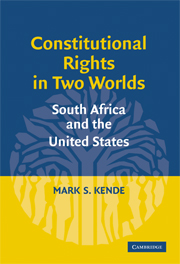1 - Introduction
Published online by Cambridge University Press: 25 July 2009
Summary
It is said in Africa that Western Culture has a ‘big mouth and small ears.’
Patrick Glenn, Legal Traditions of the World 84 (2007)For years, South Africa looked as if it would explode. The oppressed black majority and its allies were battling the powerful, wealthy, and racist apartheid regime on political and military fronts. In turn, apartheid security forces murdered heroic figures like Steven Biko and tried to assassinate Constitutional Court Justice Albie Sachs, blowing off one of his arms with a car bomb in Mozambique. South Africa's relatively peaceful transition to a multiracial democracy during the 1990s was therefore miraculous, especially compared to the civil wars that have broken out in other nations.
Historians, political scientists, and others offer explanations for why this peaceful transition occurred. Nobel Peace Prize winners Nelson Mandela and Desmond Tutu provided crucial leadership. International political and economic pressure played a role as did global developments such as the end of the Cold War. Most important, many South Africans took to the streets at great personal risk. Despite the country's AIDS pandemic, the massive gap between rich and poor that has helped produce terrible crime, and political domination by one party, South Africa now has a vibrant economy, a relatively strong infrastructure, and a critical press which enhance the prospects for social stability.
Numerous scholars have chronicled South Africa's constitutional revision process.
- Type
- Chapter
- Information
- Constitutional Rights in Two WorldsSouth Africa and the United States, pp. 1 - 15Publisher: Cambridge University PressPrint publication year: 2009



